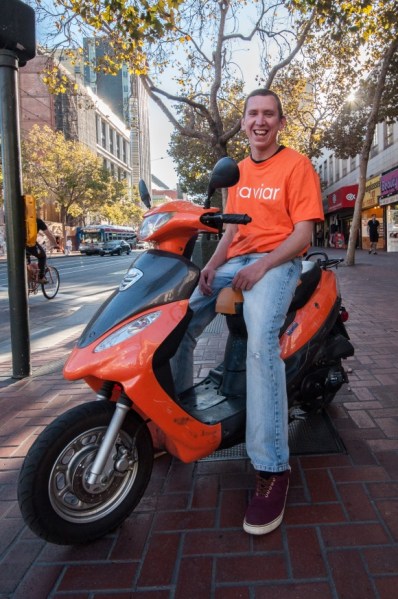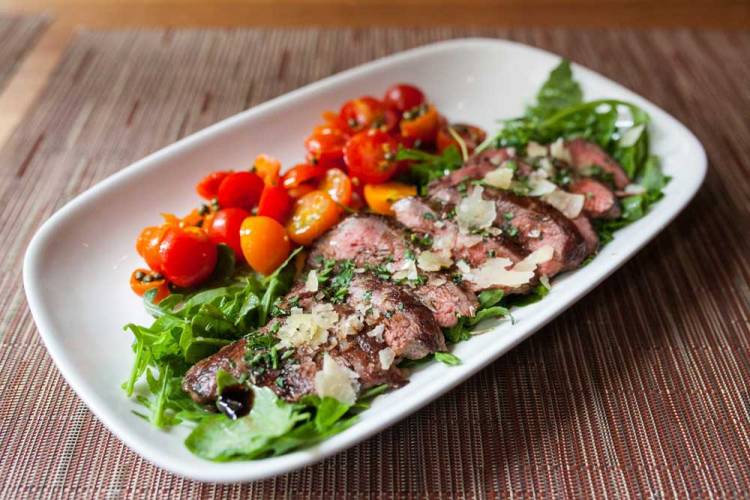This isn’t your mama’s takeout — buttermilk fried chicken and waffles, charcuterie and cheese board with country-style terrine, chopped kale salad with dried apricots and toasted quinoa, and molten Ghirardelli chocolate-filled beignets
Hungry yet?
Food delivery startup Caviar is expanding out of San Francisco today, bringing such meals to people in Seattle and New York.
“Our challenge in new markets is not operational or technical,” cofounder and CEO Jason Wang told VentureBeat. “We have a playbook that works and we’re now able to get into a major market in just a couple of months at a very low cost. The biggest challenge for us going into new markets is facing incumbents that have been around for many years.”
Caviar takes a new approach to food delivery. Its site is a steep departure from other online ordering services, like Seamless, GrubHub, Delivery.com, and Eat24, which feature an overwhelming array of options that can hit-or-miss with customers. Caviar’s ethos is quality over quantity. Caviar carefully selects the restaurants and takes beautiful, drool-worthy photographs of every dish. This is particularly useful for people like me, who find it difficult to make ordering decisions without a visual.
Caviar also stands out from Seamless and its ilk by offering delivery from restaurants that didn’t previously offer takeout service. This means you can get food from high-quality and popular restaurants without leaving your house.
 “We are finally giving local businesses, namely restaurants in our case, the ability to distribute their product to an entire city simply by plugging into our platform,” Wang said. “On the other side, we are empowering millions of people to order food from places they would normally have to spend 30 minutes getting to and then waiting 60-plus minutes in line.”
“We are finally giving local businesses, namely restaurants in our case, the ability to distribute their product to an entire city simply by plugging into our platform,” Wang said. “On the other side, we are empowering millions of people to order food from places they would normally have to spend 30 minutes getting to and then waiting 60-plus minutes in line.”
Diners can customize their orders, make special requests, and share their cart with multiple people. Caviar has no minimum order requirement, but it charges a flat $9.99 delivery rate. Once someone places an order, a delivery person will go pick up your food and deliver it to your door, with GPS tracking and times estimates along the way (on its web app or on mobile).
Caviar promises your food will be delivered within an hour, and people can schedule orders up to six days in advance. Wang said that since Caviar has direct partnerships with local restaurants, its orders get priority over other services, but a few restaurants may not offer delivery through Caviar during peak dining hours.
It also offers a service for account managers and corporate customers and is available for catering.
Wang said that Caviar currently has 60 restaurants in San Francisco and is “bottom line” profitable since debuting about a year ago. It is launching with 18 restaurants in both Seattle and New York, and the goal is to be in 10 cities by the end of 2014.
Notable Seattle restaurants include Pike Place Chowder, Japonessa, Wild Ginger, and Petra. Notable New York City restaurants include Katz’s Deli, Han Dynasty, Mission Chinese Food (it recently opened there), Pommes Frites, Nyonya, and Caracas Arepa Bar. Deliveries are free until Nov. 22 as part of a launch promotion.
Ordering food online is hardly a new concept, but the sector is going through something of a revival as startups respond to customer demand for food delivery that isn’t pizza or greasy Chinese. Young companies like Munchery, Zesty, and Sprig focus on delivering healthier food. Caviar’s focus isn’t on nutrition, but rather on elevating the quality of the online ordering experience. As a frequent online orderer of food, I prefer Caviar.
The startup participated in Y Combinator in 2011 and is one of many of its companies that add a layer of convenience and polish to what are basically errands. Prim does this for laundry, Instacart for grocery delivery, BloomThat for ordering flowers, and HomeJoy for booking a home cleaning.
It’s a case of YC entrepreneurs building services for people like them — young, busy people with disposable income who don’t have the time or patience for chores. But the bet is that it has widespread, more mainstream appeal, and that one of the glories of the Internet is you can quickly outsource tasks you don’t want to do.
Caviar has backing from Andreessen Horowitz, a number of YC partners, and a slew of angel investors. It is based in San Francisco.


